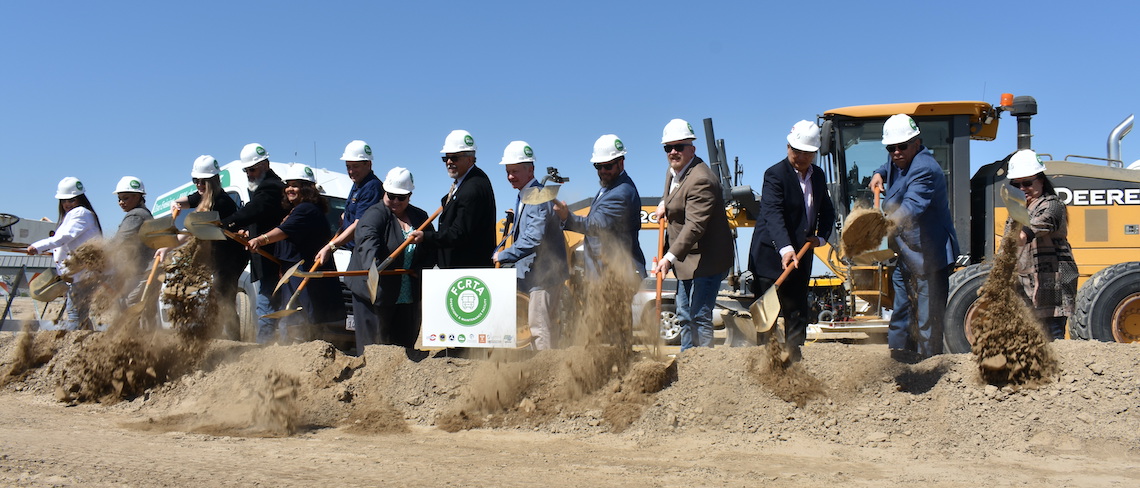
Officials with the City of Selma and guest break ground on the $15 million Fresno County Rural Transit Agency operations yard in Selma recently. Photo by Frank Lopez
Written by Frank Lopez
Competing with 800-pound gorillas like Fresno and Visalia for economic development opportunities, the Central Valley’s smaller cities are finding ways to attract investment public and private.
Ground is moving for transit systems and infrastructure repair. Cities are finding ways to attract new businesses, commercial and residential development.
Transit, safety oriented
After five years of planning, the Fresno County Rural Transit Agency (FCRTA) broke ground recently on its new operations and maintenance facility at 1821 Pacific Ave. in Selma.
The $15-million project will include a 10,000 square-foot, four-bay maintenance facility and a 5,000 square-foot dispatching and administration office. Construction is expected to be completed next January and will provide about 50 permanent jobs — and more in the future.
The FCRTA transit routes include Kingsburg, Auberry, Coalinga, Del Rey, Dinuba, Firebaugh, Mendota, Huron, Laton, Orange Cove, San Joaquin, Parlier, Fowler and Sanger.
Parlier Mayor and FCRTA Board Chair Alma Beltran and said that once the facility is online, the FCRTA can work out how to better schedule routes to fit residents’ needs, such as going to work and medical appointments.
“Everybody is not going to start work at 8 o’clock, and not everybody is going to be back at 5 o’clock,” she said. “There are different shifts.”
The City of Parlier is currently building a new police headquarters, which Beltran says is important in attracting commercial development.
For developers and businesses to want to operate or move into the area, it is vital that a community has a safe reputation, including a 24-hour fire department, Beltran said.
Beltran said Parlier has much to offer along its Manning Avenue corridor, which sees 33,000 commuters daily.
A new carwash is coming to Parlier, Beltran said, with only one other car wash existing in the city. It is expected to break ground this summer.
Transportation hub
Mayor Scott Robertson said that FCRTA project positions Selma in the vanguard of transportation issues, such as electrification.
Last November, ground broke for the FCRTA’s Golden State Boulevard Corridor Project, a 14-mile, $53.1 million transportation improvement project funded by Measure C. It will pass through the cities of Fowler, Kingsburg, and Selma, and some unincorporated areas in Fresno County.
The first phase will consist of improvements to Golden State Boulevard itself, with the second phase consisting of improvements across the railroad right of way on the local streets.
Robertson there is also a possibility of the corridor serving as a transportation hub, connecting the cities of Fowler, Selma, and Kingsburg together and to Fresno by light rail transit.
He said that this project will attract businesses to improved throughfares and support the area’s growth.
On the small business front, the City of Selma has various incentives to spur interest in setting up shop in town and maintaining the business fabric.
Downtown Selma has a business improvement district in the works to enhance the area and establish architectural themes for a consistent look. and for business owners to keep their buildings looking attractive, come up with architectural themes for a consistent look.
Robertson said he believes Selma’s downtown has the potential to be as nice as Kingsburg’s in the future.
“We have the elements in place, we just need to put it all together and I think this business improvement district will do that and that will attract business to the downtown area,” Robertson said.
South Valley draw
In Tulare County, Airica de Oliveira CEO of the Tulare County Economic Development (EDC) said that Nabis new cannabis product distribution facility in Woodlake will be a big economic spur and create jobs for the area.
“They are generating tax revenue for the city, and the city council is smart in making sure that cannabis users are paying sales tax, and those dollars then get funneled towards different city projects. It’s a for-sure win for the city,” de Oliveira said.
The EDC is getting inquiries from commercial developers in various industries, and depending on the type of project, and what the developer is looking for—logistics, acreage, square footage— some might be looking to set up in smaller communities in the county.
“Our plan for the next year is to connect with more site-selectors, generate more leads and interest for companies looking to move in the county, and increase our leads in expansion projects and support businesses already here in the county and get them resources to expand,” de Oliveira said.
Industrial growth
In Madera County’s thriving manufacturing and distribution industry, small towns like Chowchilla are focused on both commercial and industrial growth.
The Madera County EDC’s work in locating the AutoZone Northern California Distribution Center in Chowchilla sparked interest in that strategic area, said Darren Rose, Madera County EDC CEO.
WHSE Partners of Fresno, specializing in multi-tenant industrial real estate investments, will soon be opening in Madera’s key industrial area, providing facilities for small businesses. The concept is attracting attention throughout the region and nationally, Rose said.
About half of the occupants are new small businesses to Madera, with another quarter being existing Madera businesses, and the remainder being regional and national businesses creating a Central Valley footprint.








